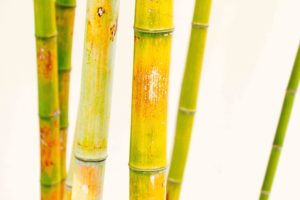We are aware that plastic has become a staple in our society. From the moment we wake up to the moment we go to sleep, plastic products are within reach. Because plastic is inexpensive to produce, it is often overlooked that it takes over 1000 years for it to biodegrade – if it even does at all – and the extraction process alone takes a large toll on the environment. Due to this, bamboo has been gaining in popularity and added into the consumer goods marketplace in order to reduce the reliance on plastic as well as other resources, such as paper. Some products that have been created that help reduce the reliance on unsustainable resources are water bottles made from bamboo, single-use bamboo utensils, bamboo toothbrushes, and even bamboo toilet paper.
 For example, switching to a bamboo toothbrush helps to lessen the reliance on a plastic product that is used multiple times a day and replaced multiple times a year. Currently, 99% of all toothbrushes in the world are made up of plastic that may never breakdown. Alternatively, bamboo toothbrush handles take around six months to fully compost. Because no oil is extracted to make the material for the handle of the bamboo toothbrush, they have a lower carbon footprint as well. For the majority of bamboo toothbrushes, when it is time to switch to a new one, the handle can be composted while the bristles must go in the trash. This being said, it’s always best to check the specific disposal instructions for the specific brand you have.
For example, switching to a bamboo toothbrush helps to lessen the reliance on a plastic product that is used multiple times a day and replaced multiple times a year. Currently, 99% of all toothbrushes in the world are made up of plastic that may never breakdown. Alternatively, bamboo toothbrush handles take around six months to fully compost. Because no oil is extracted to make the material for the handle of the bamboo toothbrush, they have a lower carbon footprint as well. For the majority of bamboo toothbrushes, when it is time to switch to a new one, the handle can be composted while the bristles must go in the trash. This being said, it’s always best to check the specific disposal instructions for the specific brand you have.
Bamboo and Sustainability
What is bamboo?
Bamboo is a type of grass with a hollow stem that is fast-growing, renewable, and extremely easy to grow. Like trees, bamboo is considered a renewable resource. Although both trees and bamboo are considered renewable, bamboo is considered to be more sustainable. When bamboo is harvested, it is typically cut, leaving the extensive root system intact. Over time, a new shoot will grow. Since bamboo is a type of grass, you can think of it like mowing the lawn – even as you cut it, it continually regrows.
Why is it more sustainable than trees?
- Because bamboo fibers are naturally anti-bacterial, it can be grown without the use of pesticides.
- Bamboo grows rapidly in the right conditions and can grow to full size in just 3-4 months. Some species can grow at the rate of 36 inches in 24 hours. Standard trees can take 30+ years to grow to full size.
- It regrows from the roots and rarely needs to be replanted.
- Bamboo absorbs 2x as much carbon dioxide as trees and produces up to 30% more oxygen than most plants and trees.
- Due to the vast root system, bamboo is an excellent soil erosion inhibitor, which helps to stabilize and restore the surrounding land and prevent landslides.
Unsustainable uses of Bamboo
Due to the sustainable and renewable attributes of bamboo, it is becoming an increasingly popular resource for the creation of products. Generally, products made from bamboo are considered eco-friendly and more sustainable than the alternatives, as long as they have not been chemically processed. That’s where the issue of bamboo clothing comes in. The chemical process of extracting cellulose from the bamboo pulp is highly toxic and a risk to human health. Also, about 50% of the hazardous waste from the production process cannot be reused and therefore goes directly into the environment. Although bamboo itself is a highly sustainable crop and can be used to make more sustainable products compared to their alternatives, bamboo fabrics may not be the most sustainable fashion solution.
Subscribe to zerowaste.com today or chat with one of TRUE Advisors to get more insights on how your business can work towards zero waste. Keep checking back here for simple zero-waste ideas and guidance!


